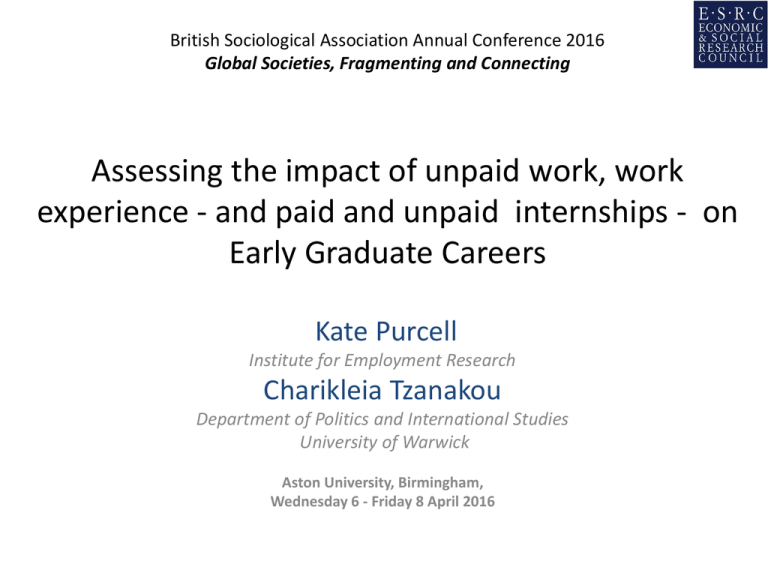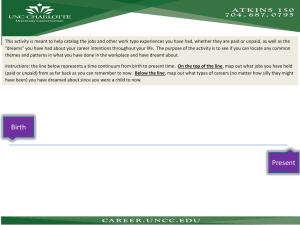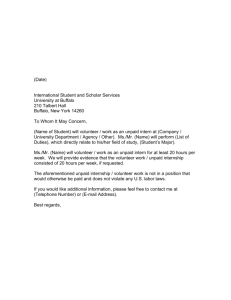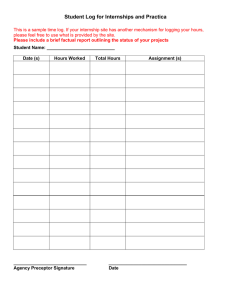Assessing the impact of unpaid work, work Early Graduate Careers
advertisement

British Sociological Association Annual Conference 2016
Global Societies, Fragmenting and Connecting
Assessing the impact of unpaid work, work
experience - and paid and unpaid internships - on
Early Graduate Careers
Kate Purcell
Institute for Employment Research
Charikleia Tzanakou
Department of Politics and International Studies
University of Warwick
Aston University, Birmingham,
Wednesday 6 - Friday 8 April 2016
Research questions in relation to internships, work
experience and unpaid work
• Conceptual issue – What ARE internships and where do they
fit in the ‘pursuit of employability skills’ spectrum?
• Statistical issue – there are no statistics!
• Lack of reliable data – How extensive is incidence? Who does
what? For how long? Where and when? Paid or unpaid?
What counts?
• Ethical issues – When are internships/unpaid work/work
experience placements a good thing or a bad thing? What
are the costs and benefits to individuals, employers and
society?
Definitions: the theory and the practice
• Wikipedia: Internships for professional careers are similar in some
ways to apprenticeships for trade and vocational jobs but lack of
standardisation and oversight leaves the term open to broad
interpretation – interns may be college or university students, high
school students, or post-graduate adults. These positions may be paid
or unpaid and are usually temporary…….Generally, an internship
consists of an exchange of services for experience between the
student and an organization.
• The realities (as indicated by research findings so far…):
– structured/unstructured, formal/informal, anything between
one week and up to twelve months, paid, ‘facilitated’ and
unpaid, sometimes involving training and development, often
constituting cheap labour, ranging from wonderful
opportunities to exploitation.
– Offered by employers planning to recruit, as an alternative to
recruiting, and as ethical professional practice/future skills
investment.
Methodology
Mixed methods, drawing on two projects:
• Futuretrack - national longitudinal survey for those
applied in 2005/06 in FT UG programmes – 4 waves
– Using wave 4 data :18-30 months after graduation
provided the pool of graduates for the Paths2Work
– UK domicile:14,994 graduates
• Paths2Work project (ESRC) – precarious pathways of
young people in the Midlands
– focus on UK domiciled graduates based in the
Midlands (applied to HE, studied or worked)
– 82 semi-structured interviews so far…
Which students worked to gain career-related
experience?
Sandwich placements: Engineers, Business and Admin, Languages, Creative
Arts and design; Medium and High Tariff HEIs and Specialist HEIs
Shorter structured placements as part of course: Medics and allied,
Education, Mass Communication, Social Studies, not Highest or high-tariff
unis
Paid work to gain career-related experience: Engineers, Business and Admin,
Languages, Creative Art and design; Specialist HEI, Highest tariff HEI
A vacation internship with an employer: Engineering, Law, Social Studies,
Specialist HEI
Unpaid work to gain career-related experience: Law, Creative Art and design,
Mass Communication, Linguistics and Classics, Education: Specialist HEI and
Highest Tariff HEI.
In unpaid internship after graduation: Architecture, Law
Students’ reasons for undertaking work experience during
their courses
Source: Futuretrack Stage 4, all UK domiciled graduates (weighted) who have an
undergraduate degree and are no longer in full time study only.
Incidence of unwaged work by socio-economic background
Higher managerial and professional occupations
Lower managerial and professional occupations
Intermediate occupations
Small employers and own account workers
Lower supervisory and technical occupations
Semi-routine occupations
Routine occupations
0%
Unpaid work during course only
5%
10%
15%
20%
25%
Unpaid work during course and having graduated
30%
35%
40%
45%
50%
Unpaid work after graduation only
Applied or intend to apply for internships by broad
socio-economic background
Routine and manual
occupations
Yes, already applied
Yes, but not applied yet
No, would like to but cannot afford
to do unpaid work
Intermediate occupations
No, would like to but can't for other
reason
No, would not like to or not
appropriate for me
Other
Managerial and professional
occupations
0%
20%
40%
60%
80%
100%
How did the students access internships..?
• Via university or department connections (including Careers Advisory
Services)
• Some (e.g. summer placements) had been competitively advertised by
organisations.
• Proactively, by approaching potential organisations and asking to be taken
on.
• By accessing mentors or via networks through whom informal arrangements
could be made
• Often, by drawing on more than one of these approaches.
POINTS THAT EMERGE:
Informal networks are VERY important, proactivity and persistence are VERY
important, HAVING FINANCIAL SUPPORT THAT FACILITATES UNPAID WORKING
IS ESSENTIAL IN MANY SECTORS…and some HEIs have better links with potential
providers of both paid and unpaid opportunities than others.
Which students access good work experience opportunities?
(The crucial influence of cultural capital…)
‘Somebody gave me advice on when I was younger, was the key to getting
out of university wasn’t just getting the degree, it was, you know, getting
the experience. I made sure that I did, I did get experience, and I did a
couple - I guess the prominent ones that were done were during the
summer, while I was doing my degree. The first one was ..a week’s, a week
long internship, it was unpaid… I went to London for a week and stayed at
Imperial College London and it was sponsored and organised and managed
by [a group of] five large solicitors and barristers in London and it was
designed for undergraduates who are considering law as a degree and a
career. So I spent a week there, you know, working with the various
companies and learning how to debate and how law works and the life of a
solicitor in the City, so that was one of them. It was completely unpaid but
it was was competitively selective, I think it was only 200 people out of the
country that were selected to do that for the one week, and so that was the
first one….
….The second one was with [an international car hire firm]..
Male, Management with marketing
At one extreme…
“The honest answer is I wrote them a letter - an email - and
they ignored me, so then my dad happened to be at a
conference where one of the members of the board was
speaking, he went up to him and complained that they’d
ignored my email… and so the guy, the member of the
board, sent – well, he asked for the email to be sent again to
him, and then he forwarded it on in the organisation and
then someone said “Okay I’ve got something this guy can
do”.
Male, managerial, professional social background, both
parents graduates, independent school, A/B grades maths
and other subjects, international relations and Russian at
highest tariff university.
Now Marketing officer, international global media start-up
company
And at the other…..
“Whilst I was at [university] I became increasingly aware that
someone from my background doesn’t have as many
opportunities, even when you get into a Russell Group
university, as someone from a rich family, because the kind
of internships that get you into the big business, they were
unpaid, a lot of them… and there was no way I could ever
consider doing so I couldn’t find any private sector
internships that I could apply for because I couldn’t afford
them. […] I’d like to have tried something in advertising and
something in publishing just, you know, ‘cause that’s sort of
the main areas that an English degree can lead to.”
Female, working class, neither parent has degree, state school,
A/B grades/no maths, good degree.
Now Secondary school teacher in state comprehensive
school.
And an interesting combination of a post-graduation experience
[Had hard time getting job and eventually took a non-grad job because she
needed to earn]’ ..I was extremely unhappy the whole time I was there
because it was minimum wage, I couldn’t live away from home, I had a very
difficult boss, the job was not particularly engaging or challenging, and again I
wanted to go back to working within archaeology or a related sector, so at that
point I was ..very unhappy….and through my mum’s connections [she worked
in the Heritage industry] - the head of [a] museum, actually, offered me [an ]
unpaid internship and by that point I had saved up some money so I said
anything is better than my current job [so did that for three months] but
obviously when that savings ran out, I had to come back home and I couldn’t
afford to stay in [another city] doing that internship any longer…[Influence of
mother] I have asked her, you know, when I was particularly looking for jobs, to
talk to people and see if there was anything.. but she’s not the kind of person
who would, you know, strong-arm people into helping me, for example, you
know, she’d very much want it to be you know, on my own terms..’
Female, Archaeology
Sandwich courses and the cumulative impact of advantage
‘As part of the yearlong internship I was in touch with the graduate and intern
recruiters, and he said “Yeah..have you thought about doing a summer internship
as well?” and I thought “Okay, I’ll give that a try!” Didn’t particularly have to go
through the full assessment, the full application process - um, it was more a few
informal chats over coffee before I was offered it’.
Male, [Chris]
‘Basically, companies would come in [to the university] so I spoke to one or
two companies that came and got a job to go abroad for [a leading agriculture
services company]’. [ He considered that it was well paid - enough to cover
costs] ‘and also to go travelling…[inter-railing at weekends] I saw a lot of
Europe!’ .He learned new technical skills: ‘It was all basically web
development but I also developed something that, to go forward with that
they, a new way of configuring the systems, there was a fair bit of client
interaction as well and supporting existing products that we had out for
clients’.
Male {Adam W]
‘I’ve actually had three different internships that were all unpaid or expenses
only, over the course of being a student. When I was in sixth form, I had a family
friend that had an advertising firm in the Midlands, so I just went and did a
couple of weeks with them just kind of learning how to write advertising briefs
and finding out about the industry…
[My current organisation] was one I particularly wanted to work at, so I went to
them directly. I was actually travelling in Australia at the time and knew when I
was coming back, so I emailed them and said I’d be willing to come in, just do
some non-paid work experience when I got back and would they be interested in
having me? I just emailed them my CV, a kind of bit about my background and
why I was interested in advertising and what I was offering, so I could come in, I
was happy to do anything for that two-week work experience period…and they
got back to me and said “Yes. Would you be available on these dates? We could
use the help on one of our projects.” A couple of days before I finished my
placement, the team that I was working within just said “Do you want to stay for longer?
We’ve got a position that we’d like to offer you..” which was a content authoring position so just putting information on a website and they said “Yeah, did I wanna carry on and
come back the following week, as an employee?”
Male, degree in Psychology, currently Account Manager in large advertising company
[Sandwich year placement] ‘was made available by the university and basically
companies would come in [to the university] so I spoke to one or two companies
that came and got a job to go abroad for [a leading agriculture services
company]’. He considered that it was well paid [enough to cover costs and also
to go travelling]…’.
Male, Mathematical and Computing Sciences
[2 six-month placements, one in Germany and one in the USA – one with a firm
that made printed fabrics and one where it was possible to develop woven
textiles skills and knowledge – both gained via comp,ex selection processes and
interview programmes held at the unversity. Textles graduate, now working in
the States for second of these.
‘…so the summer before my final year I was in [a major British-owned
multinational], for their summer internship
[Interviewer - That would have been a paid one, wasn’t it?]
Respondent ‘Yeah, that was paid, yeah, yeah, it’s oil industry, they’ve got loads of
money -, and then because I did quite well at a careers event I got in on a summer
internship after my final year in [another leading Energy company]. [The first
company] offered me to come like, offered me another summer internship after
my final year, but I’d already organised [the second one], that was paid as well’.
Female, Geology, who had also done work experience prior to HE
Work experience helps to clarify career aspirations
‘..It galvanised the fact that I definitely wanted to work in creative and radio
advertising, that was a huge thing. What I definitely didn’t want to do ,
effectively, was to be come a commercial radio producer. Being able to see the
day-to-day workings of it – it’s fun to get involved in making an advert and
getting the sound of it perfect, but actually seeing [how they worked] how
flexible they have to be in terms of taking direction from people who don’t
necessarily know best..I think it helped me I realise I want to be a writer…to be
more innovative..[not] stifled by brand..’
Female, Media and Communications
‘that was conserving artefacts and recording and, you know, things like that,
whereas that experience taught me that I want to be more involved with
people,…I’m not the kind of person that wants to conserve artefacts or things
like that, I’m more a person who wants to work with people and do interesting
things, maybe some sort of training or teaching. [….] I did acquire skills in how to
conserve objects, how to clean objects in a professional way, that I wouldn’t have
done otherwise. I didn’t hate it, you know, I thought it was still interesting, and I
think it was a valuable skill to have had, and I appreciated that I was given the
opportunity to do it but I realised that although I enjoyed it, it wasn’t something
that I wanted to do long-term’.
Female, Archaeology
‘With pharmacy, we can go down a number of different routes, so say community,
hospital and there’s also industry and academic pharmacy and after the four years of the
pharmacy course we’ve got an internship year - so to try and get myself more sellable
for that internship year I did a number of placements during the different summers…[ ]
The first one I did was at a local independent community pharmacy near where I lived
…first of all I did a week, I think it was a week or two weeks unpaid work experience
there, and then because I really liked it and they liked me, that enabled me to get holiday
work there when I went back home for Christmas and the summer..[ ] and then from
there, I then looked into going into the hospital field so I did, I think, I’m just trying to
think; yeah, my first hospital placement was at [a local hospital] and that was unpaid, but
then that allowed me to do in my second year summer vacation to get a paid placement
at [a different regional hospital]. That then led me to my third year, in which I did another
free, another unpaid internship year [in a different county hospital] and then I also then
did some industrial pharmaceutical company internship year:three, four, sorry - ten week
placement in my second and third year summers, so I had quite busy summers..
[...]because I knew the pre-reg year would be a competitive year to get a pre-reg place
and if I wanted to get one of the more competitive places, I needed to have the
experience of different avenues to get that place. . So my internship year was a split
industry and hospital programme and when I was applying for my internship year there
were only eight industrial split pre-regs - and what enabled me to get that was doing the
summer placement in industry but also the hospital experience I had in each year’.
Male, Pharmacy degree, now doing PhD
‘The [leading independent Think Tank], it gave me useful experience firstly
because it allowed me to just see a bit more about how a think tank works
and I was able to see how they work and, you know, how the research is
designed, etc, - not so much from the actual work I was doing, but from the
fact that I was sitting in the offices and I could watch what was happening
and listen to what was happening and ask questions, and obviously it gave
me useful experience and, in the understanding of that specific organisation
which then gave me a good argument for taking on the part-time work with
them…..’ [he got a second paid part-time internship]…
Interviewer: Okay, and the second internship which was sort of almost
indistinguishable from a job…?’
Interviewee: ‘All the skills I learnt there, all the skills I learnt there were sort
of relevant job skills, …from communicating with clients through researching
profits, through to writing presentations, and writing memos and
understanding specific issues, and I mean all the skills that I learnt there were
relevant job skills: none of them were qualifying me to make coffee..’
Male, International Relations with Language
Extremes of work experience
[She wrote to a local solicitor’s firm, offering to work for experience] ‘The woman was a
sole practitioner, she got in touch and said she didn’t have any full-time
vacancies, she could offer me a placement for a few months….
Interviewer “ What did you actually do, on an average day..?
‘So mainly it was drafting letters that she was sending out to clients, answering
phone calls, arranging post, photocopying, those sort of general sort of admin
related tasks. So I was living at home at the time .. - I mean the only cost really in
living were running my car, other than that I was living at home so there was no
rent or anything like that...’ [So she applied to do work a voluntary advice unit]’…
one of the lead volunteers …allowed me to sit in on one of his interviews with a
client and then he said, “Would you be happy to do, happy to do the work we’re
doing?” and I said “yes”, and then it just kicked off from there, really, and so I was
doing that for a year and a half. It was quite hands on, so pretty much from, I
think the first two weeks I was just sitting in with him with his clients, and then in
the third week I had my own clients and I was on the rota for advice and then
sometimes a client would come in …….. sometimes it would be an actual
employment tribunal case, which you’d take on and do all the preparation leading
up to the trial and then appear at the trial itself’.
Female, Law
Why do employers provide internships?
‘I think because it helps them with some of the kind of admin things, if it’s not
worth a permanent position and if they’ve got a project at the time, or it’s a
particularly busy period, it’s useful for them to have someone; and there’s
almost [sic] the element of giving back to the community - you’re helping
graduates get that experience - and then if it works out particularly well they find
someone that they’ve seen for a month, they’ve had sight of what they can do,
and then maybe offer then a position at the end’.
Interviewer: ‘So in terms of your current job, -well your previous job that led into
this one - do you think ]the company] were thinking of it as a careful recruitment
- a sort of “test and try”’?
Respondent: ‘I think, I think there was always the potential for that, so the
account that I came and worked on was different from the one they ended up
hiring me for, but it was using exactly the same skills - so I think they probably at
the time were going out to recruiters and hiring people, and actually the fact
that I’d come in means that they don’t have to go out to a recruiter, do an
interview, pay the recruiter, they can kind of see that yes, I was there for two
weeks, I could do the job…’.
Male, Advertising…’
‘…over the summer I had an intern working with me, a graduate intern and
this, because I’ve been begging for months and months to have an
administrator because I can’t do everything that I need to do, and in the end
my manager sort of agreed to have a graduate intern [fixed up through a
scheme run by one of the local universities]. It was a good experience for her
– she got some experience in the sector, the kind of sector that she wanted to
be working in; well, sort of business development side of things anyway; and
she walked straight out of the internship into a permanent full-time job for
which, I think, the experience we gave her did really help. But ultimately it
was a cheap way of getting an administrator for the summer, from our
business’ point of view……that was the reason behind it really. I suppose,
realistically there are companies and organisations that genuinely want to
give people experience but perhaps can’t pay them as much as other staff to
do it, especially in the current economic climate, but I do think there’s an
element of companies using it as an opportunity for cheap labour as well’.
Female , Biological Sciences, now working as Marketing Manager for an
Charity
Extent to which graduates believed that their current job was appropriate for
someone with their skills and qualifications
Source: Futuretrack Stage 4, all UK domiciled graduates in employment (weighted).
Emerging findings….
• Contacts and networks were almost always essential to get either paid or
unpaid work experience.
• Subject studied and HEI attended facilitated or restricted access to
opportunities (c.f. Private sector internships clustered in a few industries ).
• Proactivity on the part of students and graduates themselves was nearly
always essential; but proactivity was related to cultural capital, etc.
• Paid internships and placements were mainly highly selective and fiercely
competed for….but informal contacts could over-ride formal access
protocols
• Access was often cumulative…one opportunity led to another, often better
opportunity.
• Grads who had had experience of paid and structured work experience
placements were universally enthusiastic about the advantage they had
provided at the time and in terms of career development – reports on
unpaid work experience more diverse.
• Many excellent internships provided by charities and third sector
organisations – but less likely to be paid, so disciminatory..
For further information about the projects, see:
http://www.warwick.ac.uk/futuretrack
http://www.warwick.ac.uk/paths2work
Or contact:
Kate.Purcell@warwick.ac.uk
Tzanakou@warwick.ac.uk


